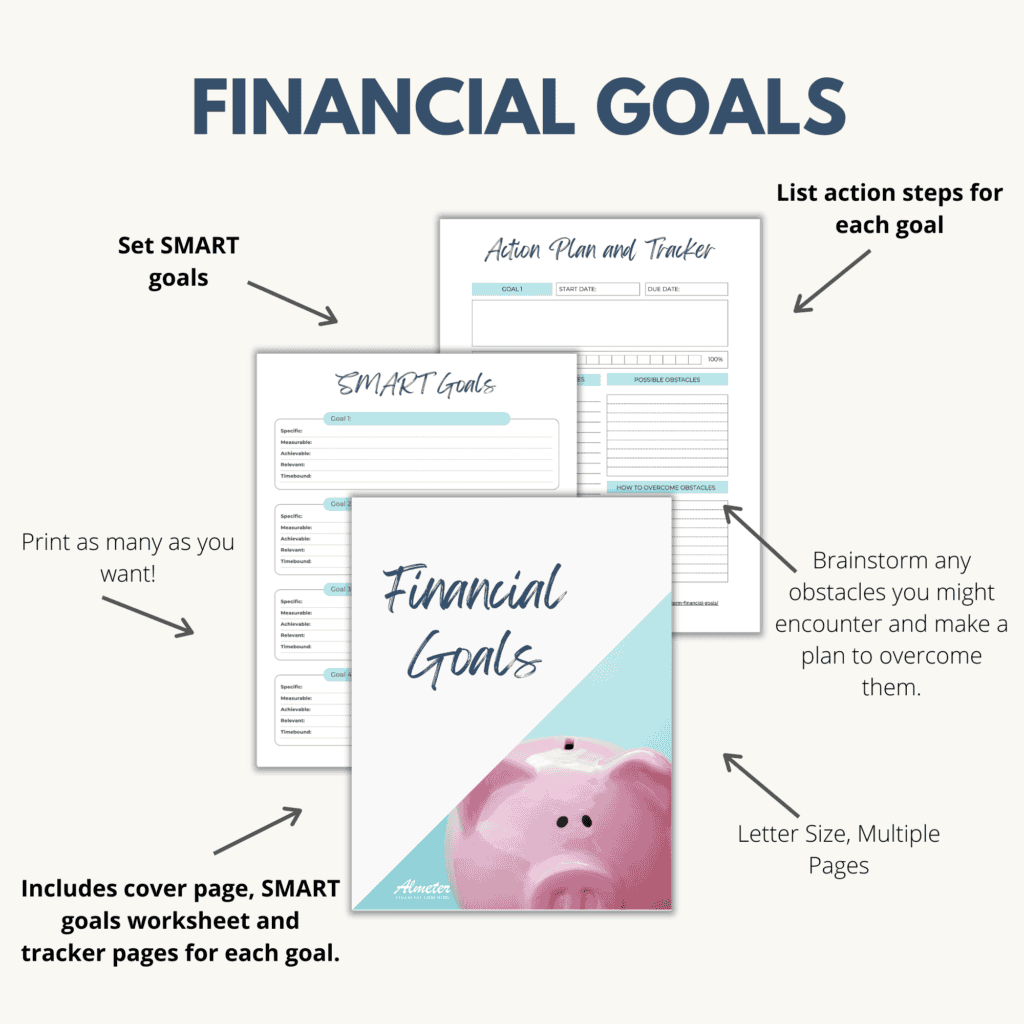Setting Short Term Financial Goals for Financial Freedom
Imagine you have zero debt and money sitting in the bank! How would that feel? Setting short term financial goals is the first step to those feelings of financial freedom and financial confidence.
You may have several money goals that you want to achieve but feel quickly overwhelmed and not sure where to start. In this post I’m going to share why short term goals don’t have to be so scary and how you can break down your big goals into small actionable steps.
What is a Short Term Financial Goal?
A short term financial goal is something you can accomplish in 1-3 years as opposed to a long term financial goal that you set for 3 or more years.
Short term and long term goals can also work together.
Paying your mortgage off early is a great example of a long term goal. It might take you 10 years to pay it off. The short term goal would be how much you would like to pay off in the next 12 months.

Why is it Important to Have Short Term Financial Goals?
Setting goals for your finances is the first step to financial freedom!
A lot of people go around saying things like “I wish I didn’t have student loans” or “I wish I had enough money to put a downpayment on a house.”
Wishing those things won’t help you get there. You have to make a plan AND take action on those plans!
A goal without a plan is only a dream.
Brian Tracy
Goals vs. Commitments
Sometimes we confuse goals with commitments. So what’s the difference?
A commitment is an action or habit you do that will help you reach your goal. Therefore the goal is the outcome of your commitments.
Maybe you said your goal is to make a budget each month. Making a budget is actually a commitment or action towards a goal.
Examples of Short Term Financial Goals
You can have several short term financial goals. Here are some examples of giving goals, income goals, savings goals and debt payoff goals.
Short Term Giving Goals
- Giving 10% of income to your church
- Donating a certain amount to your favorite charity
Short Term Income Goals
- Receive a raise
- Earn money from a side hustle
- Earn extra money through a bonus and/or commissions
- Find a new job that pays more
Short Term Savings Goals
- Saving $1,000 in a starter Emergency Fund
- Save 3-6 months of expenses in a full Emergency Fund
- Build up Sinking Funds (Christmas, down payment on home, vacation, furniture, vehicles)
Short Term Debt Payoff Goals
Using the Debt Snowball to pay off:

Setting Yearly Short Term Financial Goals
Setting yearly financial goals for giving, income, savings and debt payoff is a good place to start.
Writing your goals down gives you a higher chance of achieving them because they are front of mind. Using a personal finance goals worksheet and tracker can help you clearly identify the goals you are working on and the actions you have to take each month.
Write Down a SMART Goal
A SMART goal is Specific, Measurable, Attainable, Realistic and Timely. It gives your goal more clarity.
For example, let’s say your goal is to save for an emergency fund. That’s a good place to start but it’s very vague.
How much do you want to save for your emergency fund?
What date do you want to have it saved by?
Let’s use this as an example to make a SMART goal:
The SMART goal would be “Save $12,000 in an emergency fund by December 31.

Why is Your Goal Important?
Knowing your “why” behind your goal will help you stay motivated and focused. It’s easy to become distracted or discouraged once we set goals of any kind. Going back to your why will help remind you why you want to reach that goal.
Sometimes we have to make sacrifices and difficult decisions along the way. Your why is there to be your guide during those decisions.
Using the save $12,000 in an emergency fund example above, the why might be:
“I want to feel secure that we have money for unexpected medical expenses so we don’t have to go into debt with a credit card.”
Breaking Down Your Goals Into Actionable Steps
Having a big goal or a yearly goal might seem out of reach at first. So with any goal you have to break it down into mini milestones.
The Quarerly Financial Goals trackers will help you break down each of your goals into quarterly focus and monthly goals and action steps. This will help you stay on track so you’re not wondering what happened come December when you’re not close to reaching your goals.
To save $12,000 in 12 months you will have to save $1,000 each month. ($12,000/12 = $1,000)
Commitments to Your Financial Goals
Writing down a short term financial goal is a great start but just having a goal doesn’t mean that you will achieve it. You have to actually know what you need to do to get there!
This is where your commitments or action steps come in. What are the different things you can do each month to achieve your yearly goal?
To save $12,000 in an emergency fund your commitments might include:
- Making and following a written budget each month
- Finding areas to cut back within your budget
- Extra income opportunities
- Setting up an automatic savings with your bank
- Selling some things
Which Financial Goals to Tackle First
I hope by now you have some ideas on different goals you would like to achieve within the next year. You can have many goals for the year but how do you know which ones to focus on?
Maybe you want to pay down some debt and save for an emergency fund. If you were to do both at the same time you will gain little traction in both because you’re splitting your energy and your funds.
I love Dave Ramsey’s 7 Baby Steps to Financial Peace because it gives you a timeline for bigger goals. Putting your energy and money into one at a time will give you greater traction in that area.
Final Thoughts on Setting Financial Goals
Sometimes it may feels scary to set big goals because your brain might start to tell you why you will never reach that goal. Don’t let that stop you!
Even if you only ended up hitting 80% of that goal that is more than what you would have accomplished if you didn’t try. Or on the flip side, maybe you far exceeded your goal because you put in the focused effort!
Clearly defining your short term financial goals and action steps is the key to building your financial confidence!
Related Articles to Help You Achieve Your Money Goals
How to Set Financial Goals You Can Achieve
How a Zero-Based Budget Can Provide Money Confidence
The 7 Best Personal Finance Books You Should Read


